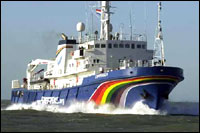Last Wednesday, more than 500 well-heeled Beltway Democrats mingled over drinks and crab dip within the stately mahogany-paneled walls of the Old Ebbitt Grill, just yards from the White House, to celebrate the launch of Environment2004 — a media campaign aiming to shred President Bush’s environmental credibility (such as it is) just in time for next year’s presidential elections. Heavy hitters from the Clinton administration, including former Interior Secretary Bruce Babbitt and former U.S. EPA Administrator Carol Browner, took the stage to sympathize with their frustrated fellow environmentalists and, more important, call on them to open their pocketbooks.

“It was a low-dollar fundraiser; we only got about $80,000 at that event,” said the group’s chief operating officer, Karen Hopfl-Harris. “But really the larger point was to announce to the world that we’re here.”
Forget the world — bring on the high rollers! It’s about time some financial heft was added to environmental outreach efforts. Bush has raised about $85 million in campaign funds this year, while Howard Dean, who is leading the Democrats in fundraising, has pulled in about $25 million. We can expect 2004 to be another Super Bowl of presidential elections, in which every top-dollar sponsor and razzle-dazzle advertisement counts.
Can environmentalists hold their own in this battle of bucks? Fundraisers are optimistic: “People are angry about Bush’s assault on the environment,” said Aimee Christensen, executive director of E’04. “They’re well aware that the environment is one of the most vulnerable areas of the Bush campaign. We’re not having a difficult time convincing them that this is a worthy electoral cause.” But, as the New York Times noted in an Oct. 17 article, “while [E’04] is trying to raise $5 million from membership donations … it currently has only $500,000 in pledges or actual contributions.”
Even if E’04 doesn’t pull in the full $5 mil, its campaign strategy should take it quite a distance. The campaign will focus on swing states with deep environmental roots, such as Florida, New Mexico, and Oregon. You may recall, with a pit in your stomach, that in the 2000 election, some traditionally green states (think Florida) went to Bush*. In both New Mexico and Oregon, which narrowly voted for Gore, Green candidate Ralph Nader raked in more votes than the Democrats’ margin of victory. (For more on campaign strategies in ’04, see articles by Keith Schneider and Mark Hertsgaard in Grist’s special edition on elections and the environment.)
“Right now, our focus is on researching the concerns of swing voters in these states — from college kids to soccer moms and factory workers,” said Christensen. “We will emphasize the connection between environmental issues and both national security and job growth, which are obviously dominant concerns right now.”
Christensen says she wants to concentrate on messages that show how Bush’s environmental and energy regulations threaten not only air quality, but employment, especially in industrial swing states such as Michigan and Pennsylvania: “When Bush relaxes New Source Review regulations that once forced power plants to upgrade their pollution technologies, he does so at the expense of the technology companies that would manufacture and install those upgrades. When he fails to encourage growth in the alternative-energy sector, he does so at the expense of jobs.”
The strategy sounds about right, but what about style? E’04 organizers say they want to try a little of everything in the media department — print, radio, Internet, cable buys in local markets — so there’s ample opportunity for flair. Perhaps those high-roller contributions would be best directed to a top-dollar Madison Ave. ad company, or better yet, an MTV impresario such as Spike Jonze who could package this message with the kind of edge and sex appeal demanded by today’s media-savvy mainstream. “We haven’t decided at this point what kind of media company to go with,” said Christensen. With just two months left until we hit 2004, this should be priority No. 1.
Fighting Fire with Fire
Environment2004 and other groups trying to add a little glamour to their green efforts may not have to look any further than a media rainmaker from their own ranks: Adam Werbach, former president of the Sierra Club (the youngest person ever to fill those shoes, at the tender age of 23) and now executive director of Common Assets Defense Fund. Werbach happens to be buddy-buddy with Alanis (Ms. Morissette, to the rest of us) and Mike D of the Beastie Boys. Those are useful friends, given that Werbach’s self-proclaimed mission — developed when he was captain of “the Club,” as he calls it — is to market the environmental message beyond the converted audience (typically middle-aged white folks) to today’s young media consumers — who for better or worse are the voters and leaders of tomorrow. “We are very bad sellers of product in the environmental movement,” Werbach told E Magazine while he was at the helm of the Sierra Club. “We try to make the issues we talk about sound confusing and radical. I believe in having stronger goals and milder messages” — the sort that can be communicated by MTV.

To that end, Werbach has launched a marketing campaign called Fire Griles that sets out to do precisely what it says: give the boot (in Sketchers, of course) to Deputy Interior Secretary and environmental nemesis Steven Griles. The campaign boasts celebrity endorsements from — you guessed it — Morissette, Mike D, and famed music producer Rick Rubin. While the graphic imagery on the Fire Griles website is catchy and hard-hitting (e.g., a street-art mugshot of Griles looking like a heroin-addled Boss Hog), the celebrity statements give the whole campaign a softer touch. “His job of overseeing our national parks is at odds with his working hard to help oil companies flourish,” Morissette practically whispers in a letter posted on her website.
You may scoff at the airbrushing, but on the whole, Werbach’s media strategy could prove very effective: “People — especially younger voters — have a gut feeling that the Bush administration is bad on the environment, but most of them can’t explain why, [because] the allegations are so sweeping,” said Werbach. “They need a face, a villain to latch onto. And Griles is clearly Enemy No. 1 of the commons. He frankly simplifies [the larger problem] into raw greed, something people can fully understand.”
Given that celebrities are, by definition, more attuned to concepts that everyone can “fully understand” than eco-wonks, Werbach leaves it up to his “Creative Council” (comprised of celebs) to choose the campaign subjects that Common Assets will focus on. “Every six weeks or so we present them with a list of campaign ideas, and this [Fire Griles] is the one they really responded to,” he said.
Already, Werbach has managed to get great press for the effort, including a recent Reuters article entitled “Morissette and Mike D Declare Eco War,” and 25,000 people have signed on to the Fire Griles petition so far — one-half of the campaign goal of 50,000. Next up: J.Lo takes on Gale Norton?
Port of No Call
Back in September, Muckraker informed you of an effort by federal prosecutors to crack down on Greenpeace after two of its members snuck onto a cargo ship off Miami that was suspected of transporting illegally harvested mahogany from Brazil. The organization was charged with conspiracy to violate an obscure 1872 law intended to stymie proprietors of boarding houses who preyed on sailors returning to port. The law forbids the unauthorized boarding of “any vessel about to arrive at the place of her destination.” The last court decision invoking the law dates from 1890.

The Esperanza is on course for Miami.
Photo: Greenpeace.
A court date has been set for December, but in the meantime, a new wrinkle has developed in the story. Greenpeace, which is known around the world for using ships and rubber boats to interfere with such practices as the dumping of nuclear waste at sea, planned to sail its newest and largest vessel, the MV Esperanza, to Miami in December to protest the court case. Or maybe not: “We’ve had a scuffle with Port of Miami [officials] who said, ‘We will not allow you to bring the Greenpeace ship in here to come and talk to the people of Miami about what’s happening,'” said John Passacantando, executive director of Greenpeace in the United States. “They said, ‘We will not allow a Greenpeace ship in, you’re a criminal organization.'”
So much for innocent until proven guilty. The individuals charged with boarding the ship have faced their punishment, and technically speaking, no criminal charges should be held against the organization at large until after the court date — if then. “We believe that the charges are going to be dismissed,” Passacantando said, “so for them to try to keep a Greenpeace ship out of a Miami port in the meantime is absurd.”
Why not just sail the 237-foot beauty into Miami anyway? Greenpeace is, after all, among the world’s most famous practitioners of civil disobedience. “I’m not sure what we’re going to do,” said Passacantando. “But we have the Esperanza heading that way, I can tell you that.”
*[Correction, 24 Oct 2003: This article originally stated that New Hampshire is a traditionally green state, but voting patterns don’t necessarily uphold that contention.]


